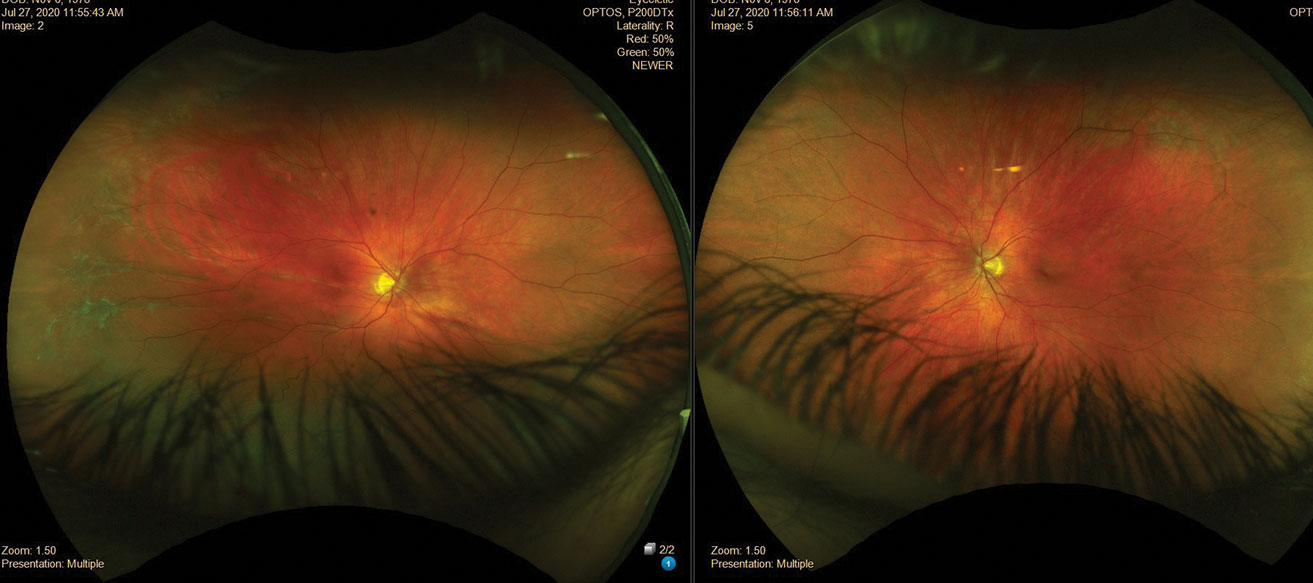 |
Q:
A 41-year-old Caucasian male came in for his annual comprehensive eye exam. However, the retinal exam revealed a total macula-off retinal detachment (RD). How quickly does surgery need to be performed?
A:
“It’s not often a retinal detachment presents without any symptoms, but in this case, that’s exactly what happened,” says Andrea Knouff, OD, of Eyeclectic Vision Source in Atlanta. The prior year patient’s VA was 20/20 OU, and his eye health exam was normal. Family history revealed his father was a high myope and had a history of RD. Dilated fundus examination revealed a total macula-off detachment OD.
Dr. Knouff pressed to see if he had noticed any flashes, floaters or curtain. The patient told her that he has been working from home due to COVID for the past three months and hadn’t noticed any changes. She immediately referred him to retina specialist Ajey Alurkar, MD, at Omni Eye Services in Atlanta.
“Practitioners should always be alert for cases like these, especially if the patient is highly myopic and has a family history of RD,” Dr. Knouff says. High myopes >-6.00D are 10 times more likely to have a retinal detachment in their lifetime.
According to the American Academy of Ophthalmology, macula-off RD may be more urgent than previously thought. A recent study from 2019 determined that macular photoreceptors may undergo more damage the longer the detachment remains, thus changing the way doctors should think about macula-off detachments as an emergent situation.1
 |
| All standard cases of mac-off RD should get fixed as quickly as possible. Click image to enlarge. |
COVID Delay
In the case of Dr. Knouff’s patient, there was a twist. He was seen immediately that Tuesday by Dr. Alurkar and was scheduled for surgery on Thursday. He was then tested for COVID-19 by the hospital as standard protocol. Unfortunately, he was positive despite being symptom-free,, and the procedure was cancelled.
“In all standard cases of macula-off RD, they should get fixed as quickly as possible because chronic detachments can dramatically affect the prognosis,” Dr. Alurkar says. “Surgery should be performed within seven to 10 days from the date of presentation or detection,” he says.
Because of his COVID positive status, this patient would have to wait another week or two so that he could complete his isolation. “It’s not the best timetable, but until he tested negative, we had no choice,” Dr. Alurkar notes. He further adds that some facilities in the Atlanta area are dropping their COVID testing requirements and basing admission on symptoms alone.
The treatment and post-op management of a macula-off RD is the same as a macula-on RD, which are often repaired within 24 to 72 hours.
Unfortunately, vision loss of three to four lines is common in macula-off RD. According to Dr. Alurkar, the outcome varies depending on age, neural plasticity, health of the patient and co-existing ocular conditions. “Macula-off detachments do cause some degree of permanent vision loss,” he says.
Be Thorough
The crucial factors in obtaining good outcomes for an RD include timely diagnosis, selection of the right intervention and careful follow-up. In an era of ultra widefield scanners and patients that may resist dilation, stand firm and make dilation a routine part of your exam. Lawsuits are still a common result of avoiding or deferring dilation.
“Try using a 30D lens to get a better look through smaller pupils,” says Dr. Knouff. “Assume everyone has peripheral retinal issues until you prove that they don’t.”
Lastly, document carefully that you dilated the patient and how you examined them. “It will guarantee the best care for the patient, and it will protect you for many years to come,” she says
| 1. Greven MA, Leng T Silva RA, et al. Reductions in final visual acuity occur even within the first three days after a macula-off retinal detachment. Br J Opthalmol. 2019;103:1503-6. |

